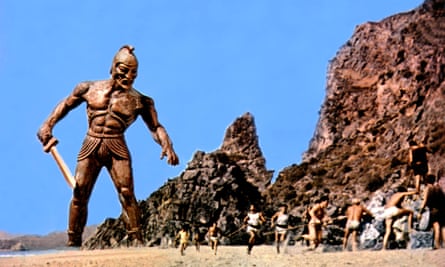
There’s an extraordinary story that could be told here about the birth of reality television in all its cruelty and superficiality. In 1998, a Japanese TV light-entertainment show called Susunu! Denpa Shōnen (“Caution! Crazy Youth”) persuaded an excitable young man, desperate for fame, to live for over a year in a single room, at first in Japan and then Korea, apparently with no human contact and no clothes, kept on starvation rations of crackers and told to do nothing but fill in entry postcards for magazine competitions – mail-in sweepstakes, with the winning card randomly picked. He was told that on winning a million yen’s worth of goods his mission would be complete; moreover he was allowed to eat and drink whatever edible or drinkable prizes he could get, including dog food. And all the time his ordeal was being broadcast to a huge Japanese TV audience without his realising it.
This was around the time of the movie The Truman Show and before our own TV staple Big Brother. It is genuinely mind-boggling, and yet this unsatisfying, naive and fundamentally uncritical documentary, despite careful modern-day interviews with the participants, doesn’t get to grips either with the story’s implications or with the story itself.
Japanese TV had long been known for its wacky endurance stunts; broadcaster Clive James had been for years serving up the zaniest clips to British audiences. But no one had seen anything like the unhappy and tasteless ordeal inflicted on Tomoaki Hamatsu, whose long face had earned him the nasty nickname of “Nasubi” – “eggplant” – from school bullies, a nickname ruthlessly used by the TV show itself. Poor Nasubi had a kind of instinctive knack of clowning and goofing around for the camera (which he evidently assumed was simply recording highlights for later); he also had an amazing stamina and ability to absorb punishment, but no sense of what was happening to him.
But what was happening to him exactly? You don’t have to be a cynic or a conspiracist to wonder about these hilariously miscellaneous goods that he was supposedly winning, having entrusted each postcard to the producers. He won nothing at first and then more and more; if his application rate was constant then his prizewinning rate ought to have been constant. Were these items being covertly delivered to him by the producers, or by the companies, once they cottoned on to what was happening on this top-rated show, and what amazing free advertising they were going to get?
Poor Nasubi. Once he was let out (although of course he was always free to leave at any time), he found a new mission in raising money with a sponsored climb of Mount Everest to help his hometown of Fukushima, hit by the 2011 earthquake. The film tries to make this a heartwarming Hollywood redemption, but it’s not particularly compelling or convincing, and there’s no real discussion of this pop-culture Stanford Experiment, no real discussion of why Japan should have tolerated it, or if and how it inspired imitators all over the world.
Source: theguardian.com





















